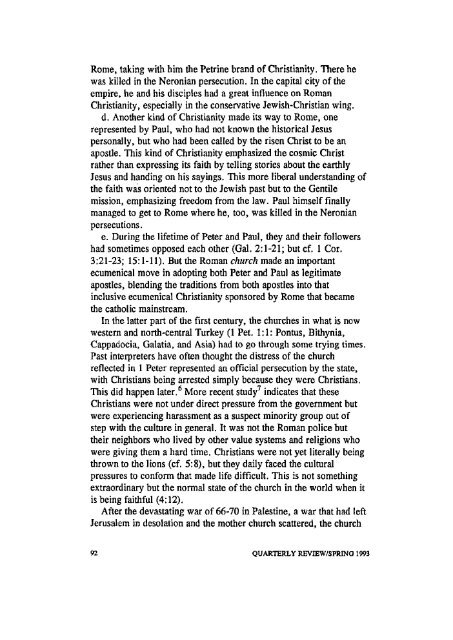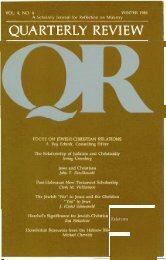TJieodore W. Jennings, Jr. The Meaning of ... - Quarterly Review
TJieodore W. Jennings, Jr. The Meaning of ... - Quarterly Review
TJieodore W. Jennings, Jr. The Meaning of ... - Quarterly Review
Create successful ePaper yourself
Turn your PDF publications into a flip-book with our unique Google optimized e-Paper software.
Rome, taking with him the Petrine brand <strong>of</strong> Christianity. <strong>The</strong>re he<br />
was killed in the Neronian persecution. In the capital city <strong>of</strong> the<br />
empire, he and his disciples had a great influence on Roman<br />
Christianity, especially in the conservative Jewish-Christian wing.<br />
d. Another kind <strong>of</strong> Christianity made its way to Rome, one<br />
represented by Paul, who had not known the historical Jesus<br />
personally, but who had been called by the risen Christ to be an<br />
apostle. This kind <strong>of</strong> Christianity emphasized the cosmic Christ<br />
rather than expressing its faith by telling stories about the earthly<br />
Jesus and handing on his sayings. This more liberal understanding <strong>of</strong><br />
the faith was oriented not to the Jewish past but to the Gentile<br />
mission, emphasizing freedom from the law. Paul himself finally<br />
managed to get to Rome where he, too, was killed in the Neronian<br />
persecutions.<br />
e. During the lifetime <strong>of</strong> Peter and Paul, they and their followers<br />
had sometimes opposed each other (Gal. 2:1-21; but cf. 1 Cor.<br />
3:21-23; 15:1-11). But the Roman church made an important<br />
ecumenical move in adopting both Peter and Paul as legitimate<br />
apostles, blending the traditions from both apostles into that<br />
inclusive ecumenical Christianity sponsored by Rome that became<br />
the catholic mainstream.<br />
In the latter part <strong>of</strong> the first century, the churches in what is now<br />
western and north-central Turkey (1 Pet. 1:1: Pontus, Bithynia,<br />
Cappadocia, Galatia, and Asia) had to go through some trying times.<br />
Past interpreters have <strong>of</strong>ten thought the distress <strong>of</strong> the church<br />
reflected in 1 Peter represented an <strong>of</strong>ficial persecution by the state,<br />
with Christians being arrested simply because they were Christians.<br />
This did happen later. 6<br />
More recent study 7<br />
indicates that these<br />
Christians were not under direct pressure from the government but<br />
were experiencing harassment as a suspect minority group out <strong>of</strong><br />
step with the culture in general. It was not the Roman police but<br />
their neighbors who lived by other value systems and religions who<br />
were giving them a hard time. Christians were not yet literally being<br />
thrown to the lions (cf. 5:8), but they daily faced the cultural<br />
pressures to conform that made life difficult. This is not something<br />
extraordinary but the normal state <strong>of</strong> the church in the world when it<br />
is being faithful (4:12).<br />
After the devastating war <strong>of</strong> 66-70 in Palestine, a war that had left<br />
Jerusalem in desolation and the mother church scattered, the church<br />
92 QUARTERLY REVIEW/SPRING 1993












